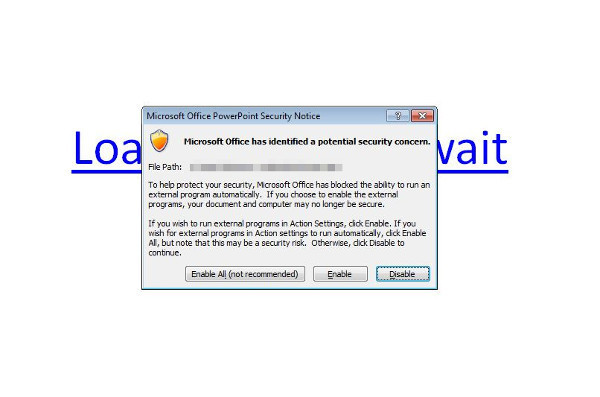TROJ_POWHOV.A
Trojan-Downloader.PowerShell.Agent.ao (Kaspersky), TrojanDownloader:O97M/Chauver.A (Microsoft), PPT/Downloader (AhnLab-V3)
Windows


Threat Type: Trojan
Destructiveness: No
Encrypted: No
In the wild: Yes
OVERVIEW
This malware is part of the malware spam attack Trend Micro uncovered early June of 2017, one that targeted certain organizations in the EMEA region. It has the capability of delivering malware through the act of showing a hyperlink's contents via mouse hover. Users affected by this malware may find the security of their systems compromised.
This Trojan arrives on a system as a file dropped by other malware or as a file downloaded unknowingly by users when visiting malicious sites.
It executes downloaded files whose malicious routines are exhibited by the affected system.
TECHNICAL DETAILS
Arrival Details
This Trojan arrives on a system as a file dropped by other malware or as a file downloaded unknowingly by users when visiting malicious sites.
Download Routine
This Trojan connects to the following website(s) to download and execute a malicious file:
- http://{BLOCKED}n.nl/c.php
- http://{BLOCKED}n.nl/2.2
It saves the files it downloads using the following names:
- %User Temp%\ii.jse detected as JS_NEMUCOD.ELDSAUGH
(Note: %User Temp% is the user's temporary folder, where it usually is C:\Documents and Settings\{user name}\Local Settings\Temp on Windows 2000, Windows Server 2003, and Windows XP (32- and 64-bit); C:\Users\{user name}\AppData\Local\Temp on Windows Vista (32- and 64-bit), Windows 7 (32- and 64-bit), Windows 8 (32- and 64-bit), Windows 8.1 (32- and 64-bit), Windows Server 2008, and Windows Server 2012.)
It executes downloaded files :
- %User Temp%\ii.jse
(Note: %User Temp% is the user's temporary folder, where it usually is C:\Documents and Settings\{user name}\Local Settings\Temp on Windows 2000, Windows Server 2003, and Windows XP (32- and 64-bit); C:\Users\{user name}\AppData\Local\Temp on Windows Vista (32- and 64-bit), Windows 7 (32- and 64-bit), Windows 8 (32- and 64-bit), Windows 8.1 (32- and 64-bit), Windows Server 2008, and Windows Server 2012.)
whose malicious routines are exhibited by the affected system.Other Details
This Trojan does the following:
- The malware uses the event of mouse hover to download the file. When the user hovers the mouse pointer to the URL in the powerpoint slide show, the Javascript file can be downloaded.
- Uses powershell to download the obfuscated javascript file.
NOTES:
The malware shows this URL during slide show:


SOLUTION
Step 1
Before doing any scans, Windows XP, Windows Vista, and Windows 7 users must disable System Restore to allow full scanning of their computers.
Step 2
Note that not all files, folders, and registry keys and entries are installed on your computer during this malware's/spyware's/grayware's execution. This may be due to incomplete installation or other operating system conditions. If you do not find the same files/folders/registry information, please proceed to the next step.
Step 3
Remove malware/grayware files dropped/downloaded by TROJ_POWHOV.A. (Note: Please skip this step if the threats listed below have already been removed.)
Step 4
Scan your computer with your Trend Micro product to delete files detected as TROJ_POWHOV.A. If the detected files have already been cleaned, deleted, or quarantined by your Trend Micro product, no further step is required. You may opt to simply delete the quarantined files. Please check this Knowledge Base page for more information.
Did this description help? Tell us how we did.


